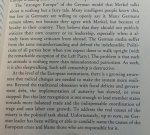Simply not true and you can change the names to any country. The UK is fully dependent on London.. the US is as dependent on California and a couple of other states and so on. My own country is dependent on Copenhagen, France is dependent on one or two cities, Spain is dependent on Madrid and Barcelona.. and so on and so on.
Also German exports are far more than niche machinery and own tech. They are world leaders in chemicals, plastics, energy, finance, technology (computers, high tech, software.. you name it) and pharma.
As for the idea that Bavaria and Baden-Wüttenberg supplement the rest of the country... actual facts talk against that. The to richest states are Hamburg and Bremen. Hesse comes in at a 4th place when talking GDP per capita. The biggest state GDP in total is North Rhine-Westphalia. As for companies being primarily in Bavaria and Baden-Wüttenberg.. also not exactly true. Frankfurt, the German financial capital is in Hesse for example. Siemens is HQed in Berlin.. and so on and so on.
While there are "poor" states in Germany, namely in the East, and places like Saarland, and these do somewhat receive transfers of wealth from the richer areas.. it is not as bleak and bad as stated in this thread.. especially when compared to other countries. For example, the transfer of wealth in the US from a handful of states to the 30 poorest states is massive. Just as the transfer of wealth from London to Wales/Scotland and NI is very high as well.. one of the biggest arguments against independence btw.


